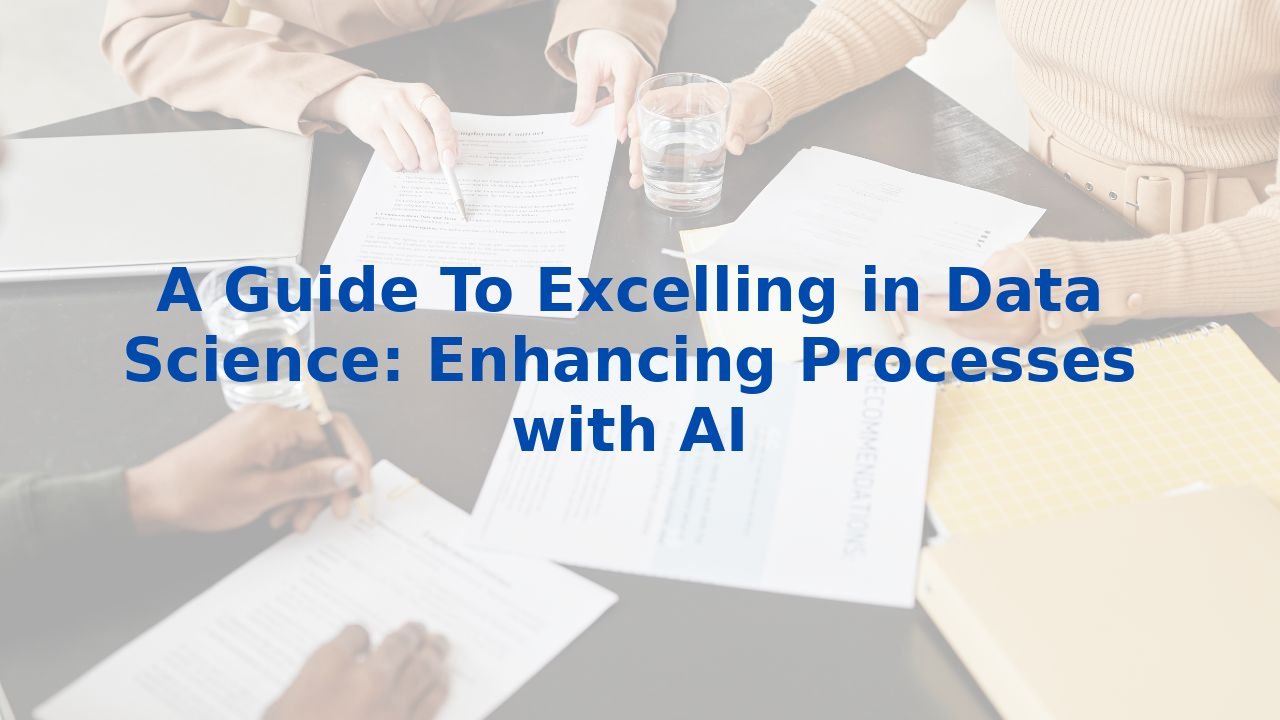A Guide To Excelling in Data Science: Enhancing Processes with AI
A Guide To Excelling in Data Science: Enhancing Processes with AI
Data science is no longer just an auxiliary function in businesses; it has become a core component that drives decisions and strategies. However, traditional data science processes can be slow, unwieldy, and resource-intensive. Enter Artificial Intelligence (AI), a transformative force that's redefining how organizations manage data. In this comprehensive guide, we'll walk through the business processes involved in data science and highlight how AI can enhance these workflows, leading to extraordinary efficiency gains.
1. Understanding Data Science Processes
Before diving into the enhancements AI offers, it's essential to first identify the key processes involved in data science:
- Data Collection: Gathering vast amounts of data from different sources.
- Data Cleaning: Ensuring data quality by correcting errors and handling missing values.
- Data Analysis: Interpreting and deriving insights from the data.
- Predictive Analytics: Utilizing models to forecast trends and behaviors.
- Natural Language Processing (NLP): Analyzing human language to extract insights from text.
- Collaboration and Communication: Collaborating with stakeholders to present actionable findings.
2. How AI Enhances Data Science Processes
Integrating AI into these processes introduces a level of efficiency and effectiveness that traditional methods simply cannot match. Here's how:
Automating Mundane Tasks
A significant bottleneck in any data science project is the tedious nature of data cleaning. AI-powered tools can automatically identify errors, rectify them, and manage missing data, freeing up data scientists to focus on critical analysis.
Enhancing Predictive Analytics
Predictive analytics is essential for any data-driven organization. With AI, machine learning models can analyze colossal datasets at unprecedented speeds. This iterative learning allows for the detection of complex patterns and relationships within data that might otherwise go unnoticed, giving organizations an edge in forecasting and strategic planning.
Making Sense of Unstructured Data
A substantial portion of data is unstructured, particularly in forms such as social media chatter or customer feedback. AI's capabilities in Natural Language Processing allow data scientists to extract valuable insights from this unstructured data, turning noise into actionable intelligence.
Facilitating Communication and Collaboration
Data scientists can't work in silos. AI tools facilitate collaboration among team members, with AI-driven code review systems that help ensure best practices are being followed. This automatic checking process not only heightens the quality of the work produced but also accelerates development timelines.
3. Benefits of AI for Improving Efficiency
The infusion of AI into data science processes offers several game-changing benefits:
- Increased Accuracy: AI minimizes human error and bias, leading to more reliable data insights.
- Cost Savings: Automating various tasks conserves time and allows for reallocating valuable resources.
- Enhanced Scalability: AI systems can continuously learn and adapt, maintaining effectiveness as datasets grow.
- Better Decision-Making: The availability of rapid insights empowers organizations to make informed, data-driven decisions.
4. The Importance of Training Employees for AI
AI can significantly boost efficiency, but the value it brings is contingent upon skilled personnel adept at utilizing these tools. Training employees for AI is an essential strategy for long-term growth:
- Improved Productivity: Training ensures data scientists can leverage AI to focus on strategic analysis rather than mundane tasks.
- Enhanced Capabilities: Empowering non-experts with AI tools democratizes data handling and opens up insights across the organization.
- Adaptability: Organizations that invest in training are better poised to pivot and adopt new AI innovations, ensuring relevance in a fast-evolving landscape.
Conclusion
The integration of AI within data science has not just optimized individual processes; it has transformed an entire industry. From streamlining data collection and cleaning to enhancing predictive analytics and interpretation of unstructured data, the efficiency gains are profound. Organizations that recognize and adapt to these changes will be better positioned for success in a data-driven economy. Additionally, prioritizing employee training in AI ensures that every individual is on board with maximizing these innovations, creating a culture of continuous improvement and adaptability.
For organizations looking to harness the full potential of AI in their data science processes, consider investing in comprehensive training programs that equip your entire workforce with the necessary tools and skills. Explore various training options available to ensure your team is ready to navigate the complexities of today's data landscape smoothly.



